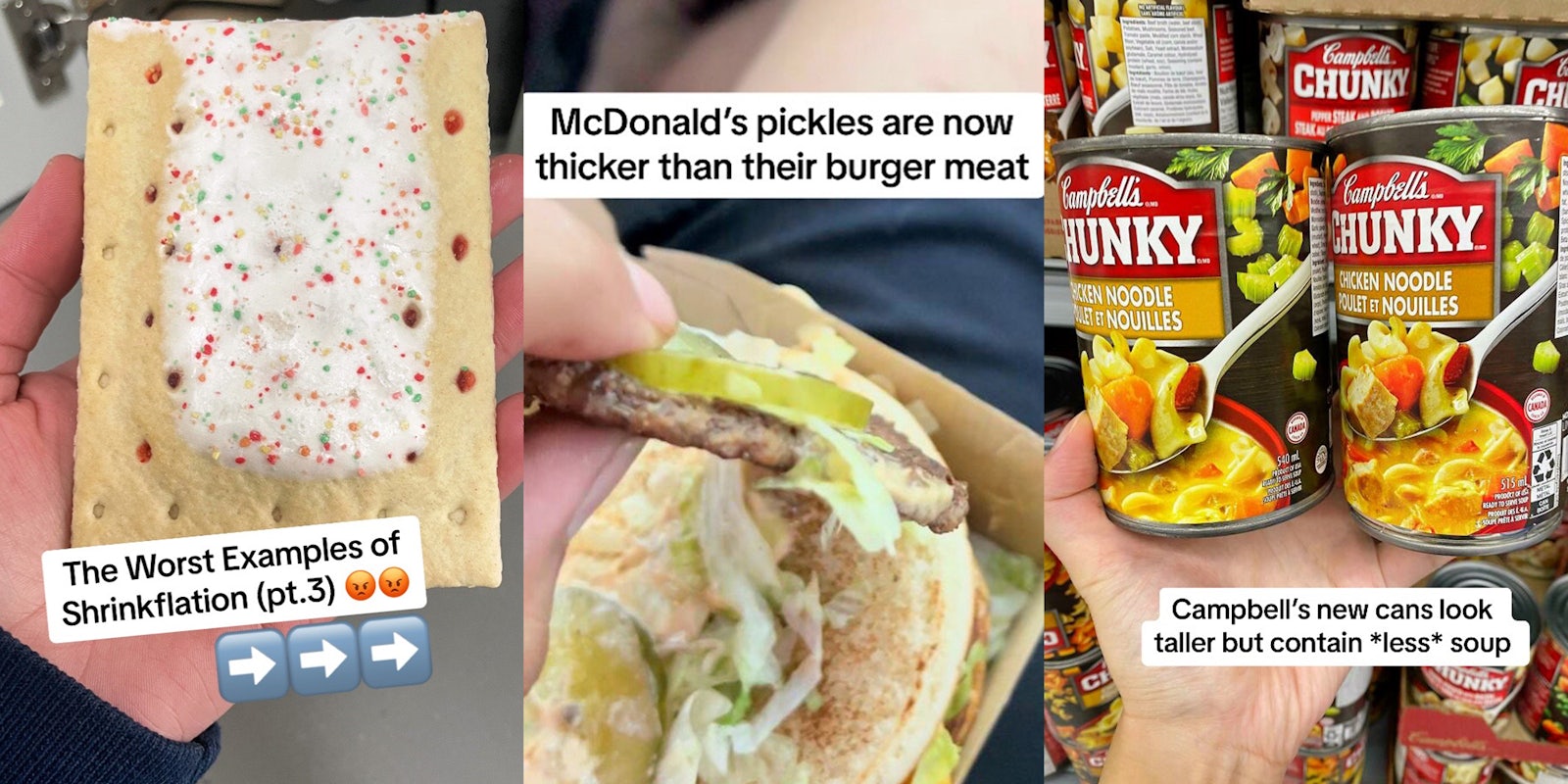A user on TikTok has gone viral after calling out several major brands for shrinking portion sizes while maintaining high prices.
In a slideshow with over 1.3 million views, TikTok user Neal (@toysoldiermarketing) shows 9 different products that he says are either smaller than they used to be or are deceptively packaged to seem bigger. He marks these products as examples of “shrinkflation.”
For context, “Shrinkflation is the practice of reducing the size of a product while maintaining its sticker price,” writes Daniel Liberto for Investopedia. “Raising the price per given amount is a strategy employed by companies, mainly in the food and beverage industries, to stealthily boost profit margins or maintain them in the face of rising input costs.”
The first image in Neal’s slideshow shows a Pop-Tart with a small amount of frosting. While Kellogg’s has not confirmed whether they’ve reduced the amount of frosting atop a typical Pop-Tart (the brand did not immediately respond to the Daily Dot’s request for comment), numerous users online have speculated that this may be the case.
Several posts on Reddit have expressed the same idea, with theories ranging from the company wishing to lower the treat’s calorie count to simply trying to save money on frosting.
Next, Neal shows an ice cream container full of cookies and cream ice cream that has been cut in half. While Neal says that “Nestle [is] offering you less chocolate the deeper down you go,” there may be a more innocent explanation, as one TikToker noted in comments.
“Cookies are hollow so they float to the top before the icecream fully freezes,” detailed a user.
The following picture shows a Dr. Oetker pizza not fully filling up a pizza pan, which Neal appears to have taken from the subreddit /r/shrinkflation. Another internet user noticed a similar drop in the amount of pizza offered, with two styles of pizza going from “850g to 740g” and “830g to 720g.”
While Neal offers many other claims through the slideshow, one of the images that sparked discussion was his claim that McDonald’s patties are smaller than they used to be. The patties are so small, the slideshow says, that the chain’s pickles now best them in width. This picture too appears to have been taken from Reddit.
However, as many users shared in comments, this example is not actually true—or at least, McDonald’s patties haven’t appeared to have changed size over the years.
“I work at McDonald’s I’ll explain the meat part, it’s all a hit or miss on the pickles sometimes they come big or small,” a user wrote. “It also depends how much meat they put down to cook at a time so they less meat they put down the thinner it will get pressed.”
“I work at maccas and I can say that the Pattie’s are the same size but the longer they stay on the grill and stay in the heaters they shrink,” echoed a second.
McDonald’s has also repeatedly denied claims that its patties have reduced in size.
In the comments section of Neal’s video, users expressed their distaste for shrinkflation.
“been eating poptarts lately and picking off A LOT MORE crust than I used to,” offered a commenter. “thought I was tripping.”
“So wait, not only are we broke and can barely afford groceries, but now we’re getting less??” asked another.
“i opened a new toothpaste yesterday. same one i had before. it’s 75ml and the old one was 110,” claimed a third.
The Daily Dot reached out to Neal via email.
Update 8:48am CT July 25: In an email to the Daily Dot, Neal said he sources images for this series “from all over the internet, and there’s unfortunately no shortage of them.”
“As an entrepreneur, I understand that brands often engage in shrinkflation to navigate rising costs while attempting to maintain their perceived value to consumers,” he wrote. “However from an ethical standpoint, I think many cases lack transparency. People have a right to know what they’re paying for, and when brands are exposed, it often leads to a breach of trust. While Shrinkflation might work as a short-term solution to current economic pressures, you can only reduce your product quality by so much – and eventually it’ll catch up to you.”



